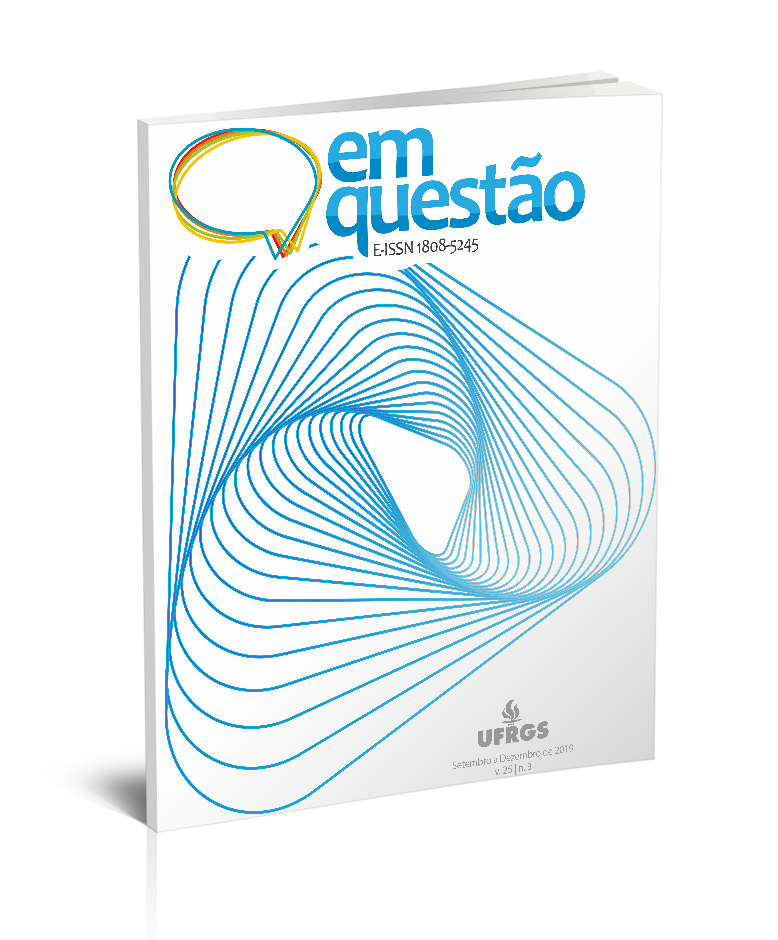The librarian and the bureaucratic administration at school: an approach of the Political-Pedagogical Project and the professional performance
DOI:
https://doi.org/10.19132/1808-5245253.81-98Keywords:
Biblioteca Escolar, Projeto Político-Pedagógico, Pedagogia Burocrática, Atuação Profissional, Bibliotecário EscolarAbstract
It is assumed as a presupposition for this study that school librarians develop a merely technical performance in schools possibly corroborated by the adhesion of the bureaucratic model of administration. This bias, however, conflicts with the acknowledgment of the technical-intellectual ambivalence of the library professional, given its various facets and professional skills that are fundamental to the school scene of the twenty-first century. In this sense, this study aimed to present the professional performance of school librarians and their experiences with the Political-Pedagogical Project of the schools where they work, considering the context of the school’s bureaucratic administration. Methodologically, it was carried out a study of exploratory, quantitative and descriptive approaches. We collected the data in four Facebook thematic groups from the application of a virtual questionnaire in the month of June 2018. As a result, we obtained that: (1) there is a narrow organizational vision on the part of the group of schools, because it creates the impression that this same group makes the possibility of horizontally and concretely interdisciplinary work impossible in the school and (2) there are institutional centrality and bureaucracy that interfere in the reach and possibility of contribution of the other professionals of the school for the construction and/or reformulation of the Political-Pedagogical Project, when the school librarian joins.
Downloads
References
AZEVEDO, M. A. R.; ANDRADE, M. F. R. O conhecimento em sala de aula: a organização do ensino numa perspectiva interdisciplinar. Educar, Curitiba, n. 30, p. 235-250, 2007.
AZEVEDO, M. A. R.; ANDRADE, M. F. R.. O papel da interdisciplinaridade e a formação do professor: aspectos histórico-filosóficos. Educação Unisinos, São Leopoldo, v. 15, n. 3, p. 206-2013, set./dez. 2011.
AZEVEDO, M. A. R.; ANDRADE, M. F. R.. Projeto político-pedagógico e o papel da equipe gestora: dilemas e possibilidades. Interacções, Lisboa, n. 21, p. 204-2018, 2012.
BRIGHENTE, M. F.; MESQUIDA, P. Paulo Freire: da denúncia da educação bancária ao anúncio de uma pedagogia libertadora. Pro-Posições, Campinas, v. 27, n. 1, p. 155-177, jan./abr. 2016.
CASTRO FILHO, C. M. As competências, os perfis e os aspectos sociais do bibliotecário na educação. RDBCI: Revista Digital de Biblioteconomia e Ciência da Informação, Campinas, v. 14, n. 2, p. 247-261, maio/ago. 2016.
CONSELHO REGIONAL DE BIBLIOTECONOMIA 6ª REGIÃO. Carreira. Belo Horizonte. 2018.
CRUZ, J. A. W. A burocracia fora do senso comum. Perspectivas Contemporâneas, Campo Mourão, v. 1, n. 1, p. 1-10, jan./jul. 2006.
FREIRE, P. Pedagogia da autonomia: saberes necessários à prática educativa. São Paulo: Paz e Terra, 1997.
FORMOSINHO, J.; ARAÚJO, J. M. Anônimo do século XX: a construção da pedagogia burocrática. In: OLIVEIRA-FORMOSINHO, J.; KISHIMOTO, T. M.; PINAZZA, M. A. (org.). Pedagogia(s) da infância: diálogos com o passado: construindo o futuro. Porto Alegre: Artmed, 2007. p. 293-327.
GADOTTI, M. Dimensão política do projeto pedagógico da Escola. In: MINAS GERAIS. Projeto de capacitação de dirigentes - PROCAD. Projeto político e pedagógico da escola. Belo Horizonte: SEE-MG, 2001. (Guia de estudos; 3).
GIL, A. C. Métodos e técnicas de pesquisa social. 5. ed. São Paulo: Atlas, 1999.
IFLA – INTERNATIONAL FEDERATION LIBRARY ASSOCIATIONS AND INSTITUTIONS. IFLA School Library Guidelines. 2. ed. Haag: IFLA, 2015.
IFLA – INTERNATIONAL FEDERATION LIBRARY ASSOCIATIONS AND INSTITUTIONS; UNESCO – ORGANIZAÇÃO DAS NAÇÕES UNIDAS PARA A EDUCAÇÃO, CIÊNCIA E A CULTURA. Manifesto IFLA/UNESCO para biblioteca escolar. São Paulo: IFLA, 2000.
IFLA – INTERNATIONAL FEDERATION LIBRARY ASSOCIATIONS AND INSTITUTIONS; UNESCO – ORGANIZAÇÃO DAS NAÇÕES UNIDAS PARA A EDUCAÇÃO, CIÊNCIA E A CULTURA. Diretrizes da IFLA/UNESCO para a biblioteca escolar. São Paulo: IFLA, 2005.
MARTINS, S.; KARPINSKI, C. Interdisciplinaridade e formação do bibliotecário para atuação em Bibliotecas Escolares. Informação & Informação, Londrina, v. 23, n. 1, p. 424-449, jan./abr. 2018.
PADILHA, P. R. Planejamento dialógico e projeto político-pedagógico da escola. In: PADILHA, P. R. Planejamento dialógico: como construir o projeto político-pedagógico da escola. São Paulo: Cortez; Instituto Paulo Freire, 2001. p. 73-93.
SECCHI, L. Modelos organizacionais e reformas da administração pública. Revista de Administração Pública, Rio de Janeiro, v. 43, 2, p. 347-369, mar./abr. 2009.
SOUZA, A. C. P. Biblioteca escolar: refletindo sobre a importância da cooperação entre o bibliotecário e a equipe pedagógica da escola. Biblionline, João Pessoa, v. 13, n. especial, p. 27-30, 2017.
TAVARES, A. M. B. N.; AZEVEDO, M. A.; MORAIS, P. S. A administração burocrática e sua repercussão na gestão escolar. Holos, Natal, v. 30, v. 2, p. 154-162, 2014.
VIANA, N. Burocracia: forma organizacional e classe social. Marxismo e Autogestão, Goiânia, v. 2, n. 3, p. 265-285, jan./jun. 2015.
WEBER, M. Economia e sociedade: fundamentos da sociologia compreensiva. Brasília: Editora UnB, 1991.
Downloads
Published
How to Cite
Issue
Section
License
Copyright (c) 2019 Em Questão

This work is licensed under a Creative Commons Attribution 4.0 International License.
Authors who publish with this journal agree to the following terms:
Authors will keep their copyright and grant the journal with the right of first publication, the work licensed under License Creative Commons Attribution (CC BY 4.0), which allows for the sharing of work and the recognition of authorship.
Authors can take on additional contracts separately for non-exclusive distribution of the version of the work published in this journal, such as publishing in an institutional repository, acknowledging its initial publication in this journal.
The articles are open access and free. In accordance with the license, you must give appropriate credit, provide a link to the license, and indicate if changes were made. You may not apply legal terms or technological measures that legally restrict others from doing anything the license permits.













